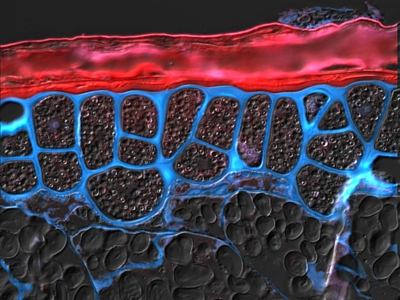The ARC Centre of Excellence in Plant Cell Walls, a $32 million research center headquartered at the University of Adelaide, has been opened by ARC’s Chief Executive Officer, Margaret Sheil.
The ARC Centre of Excellence in Plant Cell Walls is trying to identify methods of modifying the macromolecules within the cell walls or biomass in plants, especially in cereal crops and grasses, to optimize bioethanol manufacturing, paper and pulp production and malting processes for beer manufacturing.
 A section of a mature barley grain stained with calcofluor (fluorescent dye) to highlight the endosperm cell walls (blue) and seed coat (red).
A section of a mature barley grain stained with calcofluor (fluorescent dye) to highlight the endosperm cell walls (blue) and seed coat (red).
Decreasing the danger of serious human illnesses by modifying the levels of soluble fibers in grains is the other key objective of the center. The scientists at the center will investigate the polysaccharides in plant biomass and they will work to modify the polysaccharides in cereals and grasses to optimize the benefits to the industry and human health. The advantages include more fibre in grains, which will decrease the occurrence of type 2 diabetes, cardiovascular diseases, colorectal cancer and numerous other serious diseases and better animal nutrition as they need reduced levels of beta-glucan.
The presence of glucans in grains is unwanted for brewers and malsters, as beta-glucans are responsible for beer haze and would slow water ingestion during the germination of the grain.The cell wall group in Adelaide in partnership with Viterra is working on this field.
Bioethanol is an alternative fuel and is manufactured through sugar fermentation process. Grasses are an important source of biomass for the production of bioethanol. Controlling the cell wall composition could improve the quantity of fermentable sugar in the plants. The Waite Campus scientists were able to increase the beta-glucan level by up to 10 folds in the barley plant tissue. The United Science and Australian universities and private firms are investing in these research fields in the ARC Centre of Excellence in Plant Cell Walls.